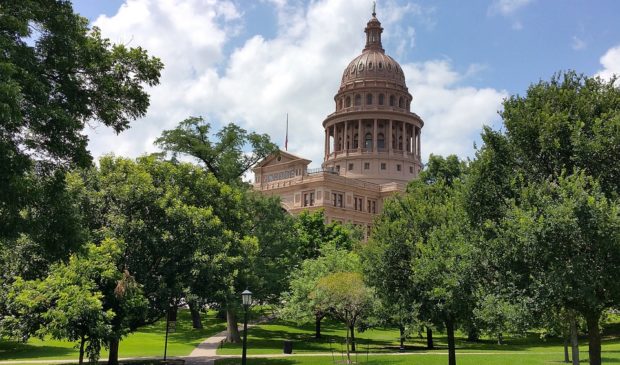Dueling tree ordinance bills advance
Friday, July 28, 2017 by
Jo Clifton The Texas House of Representatives on Thursday approved legislation that would allow developers to get credit for planting trees to substitute for mitigation fees that cities might otherwise require from them when they remove trees from their property.
House Bill 7 by state Rep. Dade Phelan (R-Beaumont) won approval with 132 yeas and 11 nays, according to an unofficial count. Austin Republican Rep. Paul Workman, who sponsored HB 70, which would eliminate tree ordinances across the state, voted no. All other Austin House members voted in favor except state Rep. Dawnna Dukes, who was counted as absent without an excuse.
Phelan’s bill was sent to the Texas Senate, where its fate is uncertain, just as Senate Bill 14 by state Sen. Bob Hall (R-Edgewood) was sent to the House after winning approval on a 17-13 vote. Its fate is also uncertain.
According to the Quorum Report, HB 7 is identical to a bill vetoed by Gov. Greg Abbott after the regular session this spring. Abbott has made it clear that he wanted to rid the state of municipal tree ordinances, especially Austin’s.
Meanwhile, Workman’s HB 70 drew some supporters and a lengthy list of opponents during a hearing at the House Committee on Urban Affairs on Tuesday.
Workman told the committee he was sponsoring the bill because, “Local control should be an effective tool for preserving individual liberties, but too many local governments have corrupted the purpose of local control, and are stripping freedom from Texans.”
Workman’s bill, however, would have allowed homeowners associations to have regulations similar to city ordinances regulating tree removal. According to the Quorum Report, that fact did not sit well with a number of witnesses who were angry that while The Woodlands might enjoy restrictions on tree removal, the people of Galveston would not have that protection.
Andrew Dobbs with the Texas Campaign for the Environment is one of the leaders of the coalition trying to protect tree ordinances across the state. Dobbs told the Austin Monitor on Thursday, “The coalition is pretty much everybody in Texas except for homebuilders, developers and ideological extremists – and even some of those folks are on our side. It’s everybody. … Trees are very important. They provide so many different benefits to our land, to our water, to our communities, to our economy. If this bill goes through, you’re going to see huge losses of trees in large parts of the state, especially in parts of the state where we really need them.”
Dobbs said trees would be particularly targeted in areas where rapid development is occurring, “but everywhere needs them. What we’ve seen is that when you cut trees down and you pave things over, you create a lot of flood problems and growth is happening in places where you already have flood problems. You do this and you just accelerate those challenges,” he said.
Workman and the bill’s supporters stressed that property owners, not the government, should decide when a tree should be removed.
Those wishing to speak against SB 14, HB 70’s companion legislation in the Senate, included more than 40 witnesses. The list includes a number of environmentalists and people from the cities of Galveston, San Antonio, Sugar Land, Houston, West Lake Hills, Fort Worth, Leakey, Live Oak, Round Rock, Pflugerville and Austin. There were numerous others who signed up against the bill but did not wish to speak.
On the other side, there were only two witnesses in favor of the bill registered to testify. One of those was Bryan Mathew, a policy analyst for the Texas Public Policy Foundation, and the other one was David Covey of Orange, representing himself. A number of others, including representatives of the Real Estate Council of Austin and the Texas Farm Bureau supported Workman’s bill but didn’t testify.
In a normal session, Hall’s bill would go to the House Committee on Urban Affairs, Phelan’s bill would go to the Senate Committee on Business & Commerce, and eventually the two sides would get together and one bill would emerge. However, this is an extra special session and there’s no telling whether either bill will end up on the governor’s desk.
The Austin Monitor’s work is made possible by donations from the community. Though our reporting covers donors from time to time, we are careful to keep business and editorial efforts separate while maintaining transparency. A complete list of donors is available here, and our code of ethics is explained here.
You're a community leader
And we’re honored you look to us for serious, in-depth news. You know a strong community needs local and dedicated watchdog reporting. We’re here for you and that won’t change. Now will you take the powerful next step and support our nonprofit news organization?








